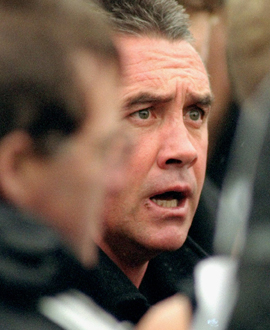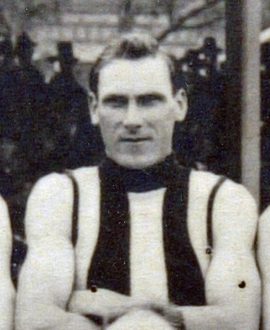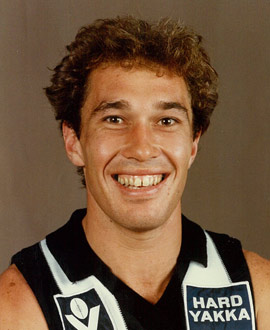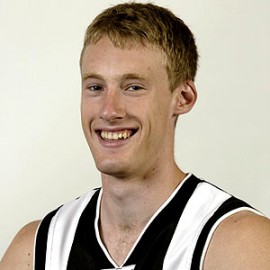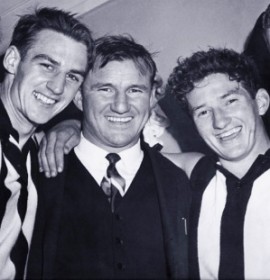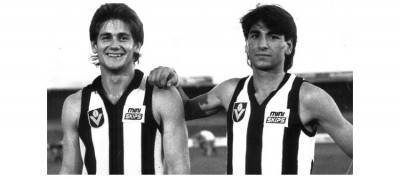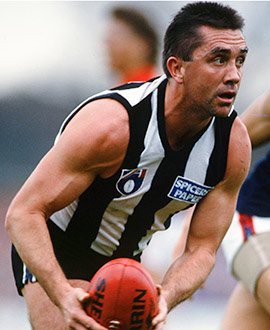Coach: 1996-99
Games coached: 88
When Tony Shaw finished his playing career in 1994, he stood among the greatest of Magpie players. A club record 313 games, two Copeland Trophies, a Norm Smith Medal, all-Australian and Premiership captain. Footballing CVs don't come much better than that.
But as sad as Collingwood fans were to see him leave the field, there still seemed to be much to look forward to. Most observers thought he would make an excellent senior coach. He'd made the most out of his natural ability, had shown football 'smarts' almost from day one, and had demonstrated a great capacity to inspire those around him.
Carlton certainly recognised the potential, and offered him a position as assistant coach under the highly regarded David Parkin. 'Shawry' was seriously tempted by the offer and was all set to sign, until a meeting with the notoriously vocal Carlton President John Elliott made him think twice: could he actually work under a bloke like Elliott?
While Shaw wavered, Collingwood swooped – offering him a similar role at Victoria Park, under Leigh Matthews. Shaw said yes, and when the one-time 'coach for life' Matthews was dumped 12 months later, Tony Shaw took on the role as Collingwood senior coach.
Unfortunately, the next four years turned out to be unhappy ones, both for Shaw and the club. But the early signs were actually encouraging. Shaw promised "changes and new ideas", and he delivered. The new game plan was much more attacking, and players were encouraged to take the game on wherever possible. There was also a far greater emphasis on structures and how the team would function at set plays, an approach that turned out to be ahead of its time.
Even while trying to adapt to Shaw's new game plan, the team started the 1996 season well but then fell into what would become a disturbingly familiar mid-season slump, losing eight games in a row. The Pies ended up in 11th place, one place lower than 1995 but with one more win. An extra win came in 1997, though with a percentage that was the sixth best in the competition, a reflection of Shaw's attacking philosophy. The team would often kick reasonable scores but still wind up on the wrong side of the result.
Two years outside the finals convinced Shaw that he needed to rein in some of the more adventurous elements of his team's style of play. But he admitted later that he over-corrected, tightening up too much and hampering the attacking play that had been the Pies' strong suit. The results weren't pretty, with Collingwood finishing in 14th spot.
That result prompted the most unedifying moment of Shaw's reign, when it became public that the club had secretly approached former Geelong player, and then Sydney assistant coach, Damian Drum to replace him. But Drum knocked back the offer, instead choosing to take the job with Fremantle the next year, and news of the approach leaked, leaving the club red-faced and Shaw severely embarrassed.
"I thought I'd seen it all with everything I've been through in 17 years of footy, but that was the hardest thing I've experienced," Shaw said later. "I'm not going to lie. People see you as being hard when you're a coach, but that was probably the hardest three weeks – really it was six weeks – of my football career."
This was a traumatic time for Collingwood, with the first bloodless coup in Magpie history when Eddie McGuire took over as President. And he, too, was mortified by what had happened to Shaw. It was actually one of the final catalysts that prompted him to take the top job at the Pies.
"I came down here that night…I remember going back to work [afterwards] and feeling really disappointed by the whole thing," McGuire said later. "We had Shawry almost in tears on the front doorstep, so emotional …I thought, well, what's gone wrong?"
In the end, the club honoured the final year of Shaw's contract and gave him one last chance to prove himself. But it didn't work out: the team finished bottom of the ladder, and Shaw's last game as coach was also the last game the club played at Victoria Park. So he was in the unique position of knowing that the game would be his last in charge, and also knowing that his pre-match address was being televised live to hundreds of thousands of Magpie fans.
The crowd was silent as he delivered his final instructions to his players. He gave one last plea for the team to play with passion. More than most, he knew what the history of the place meant to the fans. He named some of the players who had carried the hopes of Collingwood. “Just go out there and know that there are 30,000 people out there who would love to be in your position today,” Shaw said calmly, but with purpose. “They would do anything to be in your position today.”
The speech was inspirational, but it wasn't enough. The damp squib of a performance that day put a full stop on the Tony Shaw era. And even though history doesn't judge those years kindly, it has to be said that Shawry didn't necessarily have a great playing list at his disposal. It's also worth remembering that future stars such as Simon Prestigiacomo, Chris Tarrant, Paul Licuria, Anthony Rocca and more all got their starts during that time.
Tony Shaw might not have had a successful stint as Collingwood coach, but it wasn't for lack of effort, or passion for the club. Nothing that happened then changes the fact that he is, and will always be, a Collingwood legend.
